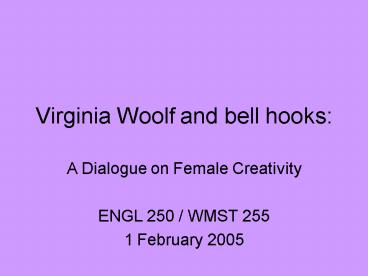Virginia Woolf and bell hooks: - PowerPoint PPT Presentation
1 / 12
Title:
Virginia Woolf and bell hooks:
Description:
An emphasis on the cultural and historical repression of ... Why does she make so much of the sentence 'Chloe liked Olivia' (p. 56)? Tricky Things continued ... – PowerPoint PPT presentation
Number of Views:652
Avg rating:3.0/5.0
Title: Virginia Woolf and bell hooks:
1
Virginia Woolf and bell hooks
- A Dialogue on Female Creativity
- ENGL 250 / WMST 255
- 1 February 2005
2
Points in Common
- An emphasis on the cultural and historical
repression of women writers - An assumption that literature and literary
history are shaped by the interactions of
language, gender, and class. - A critique of the myth of the author as sovereign
and solitary and of his perspective as
universal and male. (See Woolf on Shakespeares
sister p. 38 and on masterpieces p. 47 see
hooks on the importance of legacy, allies,
support p. 76.)
3
An Important Difference
- Woolf tends to emphasize class, where hooks
emphasizes race. Specifically, hooks is
interested in making sure that African-American
womens speech has power and authority. Note
hookss use of the term terrorism to describe
the social processes that suppress womens voices.
4
A Room of Ones OwnKey Points and Strategies
- Room as polemic a vigorously argumentative
work, setting forth its authors attitudes on a
highly controversial subject (A Handbook to
Literature, 3rd edition). Important precursors
Wollstonecraft, A Vindication of the Rights of
Women (1792) and John Stuart Mill, The Subjection
of Women (1869). But its also a polemic written
in a witty, conversational style that is in
itself an act of feminist critiqueof the dry,
rational, objective style of masculine argument.
5
The Context of Room
- Published in 1929
- Woolf an accomplished novelist, critic, and
publisher, with her husband Leonard, of Sigmund
Freud, T.S. Eliot, and others. Also an advocate
for womens suffrage. - The tumultuous period between WWI and WWII the
battle for the vote and the rise of fascism in
Europe.
6
Rooms Major Questions
- What do women need in order to create?
- Historically, what barriers have prevented women
from reaching their creative potential? - What might womens writing become in the future?
- (From Longman, p.15)
7
Things to Love and Remember about Room
- The fishing for thought metaphor (p. 17)
- Lunch at Oxbridge (pp. 19-20) vs. dinner at
Fernham (pp. 23-4) - The way the war keeps intruding, finding its way
into the discussion (e.g., pp. 20-22) - Woolfs emphasis on the need for physical space
(a room), material support (money), and community
(friends, mentors, precursors) to make creativity
possible
8
A Big Thing
- Her effort to confront and deconstruct the
masculinism and misogyny of patriarchal
cultureher survey of books on women by men (pp.
27-32) of hostile responses to creative women
(pp. 41-42)
9
Things continued
- Women as looking-glasses (pp. 32-3)which takes
us into the psychological dynamics of patriarchy - Her feminist critique of history and her call for
a re-write, a supplement, a gathering up of the
scattered bits of knowledge about womens lives
(p. 37) - Her wonderful Judith Shakespeare (pp. 38-9) and
the theory that womens creativity often led to
madness or suicide - Anon. . .was often a woman (p. 39)
10
More Things
- Her theory of the incandescent mind (p. 43)of
the need for a mind free from anger and
impediment. Is this the same as the
androgynous mind she discusses later on (p.
64)? - Her sketch of a feminist literary history (pp.
43-54). Note her emphasis on the middle-class
woman beginning to write, her comparison of Jane
Austen and Charlotte Bronte, her insistence on
the importance of tradition For we think back
through our mothers if we are women (p. 53).
11
Some Tricky Things
- Consider Woolfs comments on gender and language
on pp. 53-54. Should we take literally her
suggestion that womens books should be shorter
because the book has somehow to be adapted to
the body? - Why does she make so much of the sentence Chloe
liked Olivia (p. 56)?
12
Tricky Things continued
- What do you make of Woolfs ending? (pp. 67-72)
Think about the shift in voice, the effort to
forestall criticism, the comments on women on the
bottom of p. 70, and the return of Judith
Shakespeare at the very end.































